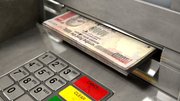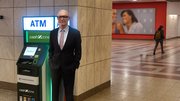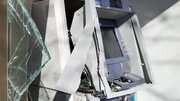Article
On board with ISOs
The British ATM market is in for the ride of its life, now that independent deployers are on the scene in full force. ISOs are counting on a combination of market forces, regulatory changes and just plain luck to ease their entry into the UK.
The British ATM market is in for the ride of its life, now that independent deployers are on the scene in full force. ISOs are counting on a combination of market forces, regulatory changes and just plain luck to ease their entry into the UK.
Though all agree that the entry of independents will mean more machines, no one seems sure of just how much the UK's installed base – currently at about 33,000 ATMs -- will grow in the next few years.
"If you had asked me a year or so ago, I would have said no more than 5,000 or 6,000, maybe 8,000, additional ATMs," said John Hardy, CEO of Link, the UK's national ATM network. "But now I'd say the number will probably be a minimum of 20,000."
Members of Link, under pressure from the government to create a more competitive environment in the financial services industry, last March voted to allow direct admittance of independents to the network. Previously, ISOs had to be sponsored by a financial institution.
Hardy noted that the five independent deployers recently admitted to Link -- Moneybox Corporation Ltd., Securicor, Infocash, Hanco Systemsand TRM Corporation– have collectively announced plans to install more than 10,000 machines in the next two years. He said ISOs have already deployed about 3,100 ATMs.
"I think by year-end of 2001 you'll have a number in the low 40s," predicted Tom Hannon, Hanco's president.
Simon Rubin, NCR'smarketing director for Europe, the Middle East and Africa, said NCR anticipates an increase of 20 percent in the UK's ATM population by the end of this year.
"I would be disappointed if the installed base didn't grow at a rate of 200 or 300 machines a month over the next three to four years," said Kevin Bond, managing director of De La Rue'sOEM division.
"The general belief is that the installed base could double within three years," said Brian Kett, Triton's senior vice president of sales and marketing.
(Sur)charge ahead
Just as in the U.S., the biggest impetus for growth is likely to be the surcharge. Controversy over a convenience fee has raged for more than a year now in the UK, triggered by Barclays Bank's decision to impose a £1 fee on non-customers for using its ATMs.
The announcement created a firestorm of negative publicity and a round of in-fighting among Link's financial institution members. At one point, the Nationwide Building Society threatened to take legal action against Barclays if it instituted a surcharge.
Ultimately, the 34 financial institution members of Link -- including Barclays -- made a surprising decision to drop not only the surcharge but also the so-called "disloyalty fee." More often referred to as a foreign fee in the U.S., it's the charge consumers pay to their own bank for using an out-of-network ATM.
ISOs, however, operate under no such restrictions. The first off-site deployer to collect a convenience fee in the UK, in December of 1998, was Euronet. When a BBC correspondent interviewed customers at the ATM, which was deployed under the sponsorship of the financial institution Woolwich plc, he found they didn't object to the £1 fee; a bus ticket to the nearest alternative would have cost more.
While Bond, of De La Rue, believes British consumers may be "reluctant" to pay a fee at first, he said "convenience will be compelling."
Mark Mills, CEO of the ISO CashCard Services Limited, thinks the banks' decision to drop all ATM fees will actually benefit independents. "It takes down the fear about what they're being charged," he said, noting that all fees will be disclosed at the time of the transaction.
Before the decision, he explained, customers were often uncertain about what they were paying since disloyalty fees were not revealed at the machine. Instead, as in the U.S., they showed up on customers' bank statements. And banks had established a confusing collection of reciprocal agreements -- so, for instance, Barclays customers could use Lloyds ATMs free of charge and vice versa.
Link plans to deliver full fee transparency by January of 2001, Hardy said. Any charge -- whether a surcharge or a foreign fee -- will be revealed at the ATM and customers given an option to cancel the transaction.
Hardy noted that any Link member -- whether an independent or a financial institution -- is free to collect either a surcharge or a foreign fee, but not both. If a deployer opts to issue a surcharge, he forfeits any interchange revenue. LINK has drawn a distinction between the interchange and issuer or acquirer fees. While interchange is set by the network, Hardy added, the other fees are not mandated by Link. Members have agreed, however, that there will be no double charging of fees and that the acquirer fee will always take precedence over the issuer fee in the debit card market.
Although the amount of the surcharge is likely to be market driven, Carlos Siewczynski, Tidel's vice president of international sales, believes it may end up being somewhat higher than in the U.S. because of the lack of other "hidden" fees.
Consumers will make the distinction between independent and bank-owned ATMs and understand that the surcharge is the ISO's key to profit, opined Hardy of the Link network."urn:schemas-microsoft-com:office:office" /><?xml:namespace prefix = o />
"I think by and large that the public realizes that, as opposed to banks looking to offer a service to their cardholders, independents are simply there to make money off an ATM. They recognize that independents are going to put ATMs in places with lower transaction volumes," Hardy said. "If you want the ultimate convenience of not having to walk more than 50 yards, then you're going to have to pay for it."
Pump up the volumes
Volumes at off-site locations in the UK are typically much higher than the 200 to 500 transactions a month cranked out by most retail machines in the U.S. today.
Paul Stanley, managing director of Moneybox, said his company looks for locations with foot traffic of 6,000 to 8,000 a week. "We're looking to do in excess of 20,000 transactions a year per machine, and we're achieving those levels quite comfortably."
That's partly due to a "first mover's advantage," Stanley said. "The market's a little more open."
Moneybox, which has installed more than 1,000 machines in its first year of operation, works primarily with large chain retailers, locking them into long-term contracts of seven years or more. "We don't go knocking on doors one at a time. We try to deal with groups where we can pick 50 or 60 ATMs in one deal," Stanley said. Finding takers hasn't been difficult, he added, because of a pent-up demand for ATMs.
"There was a high level of frustration in the retail community when we arrived on the scene in '98," agreed Ron Delnevo, UK operations manager of Euronet, which has deployed more than 300 machines to date in the UK. "They had been talking to major banks about ATM deployment and had achieved very little because most banks were reluctant to make a major commitment to off-branch sites."
Banks had confined their off-site deployment to such highly trafficked sites as airports, railway stations and the largest chain retail stores, Delnevo added.
As in the early days of U.S. off-site deployment, British retailers are more interested in the possibility of building foot traffic with ATMs rather than making a profit from them. That effect will inevitably fade as the installed base grows, leading retailers to take a harder look at transaction numbers and their relationship to surcharge-driven revenue.
"We're not yet talking to retailers about a situation where they might have 200 to 300 transactions a month. That wouldn't be acceptable to us, and it's not certain how long it will be before it's acceptable to British retailers," Delnevo said. "At this moment in time, I don't think many retailers want to spend thousands of pounds buying a machine, thinking it will only do a few hundred transactions a month."
Unlike his British counterparts, Hanco's Hannon said he hasn't found consistently high transaction levels. "I wish I could say our average coming out of the gate was astronomical, but it's about what I expected. We have machines doing 3,000 to 4,000 a month there, and we have machines that do 220."
He added, "You hear stories about all of these terminals doing thousands and thousands of transactions – but I know they sure pick up a lot of them and move them."
Most ISOs seem to be focusing their efforts on signing large chain retailers. Moneybox has inked exclusive contracts with First Leisure Nightclubs and Late Night Bars, among others, through the efforts of a full-time sales staff. Relying heavily on independent brokers and a commission-only sales force, standard practice in some off-site models, is a "weakness," Stanley said.
One ISO that isn't chasing the big accounts is CashCard. Mills experienced success with an earlier business of providing free post office boxes, funded by third-party advertisements, to consumers at gas stations. Because of those pre-existing relationships with station owners, he said, "we know where the hidden jewels are."
"The huge chains aren't really our style," Mills said. "We've been offered deals for 200 to 300 machines where 50 percent of them are great and 50 percent are no good – therefore, as a mean average, they'll all do OK. We're more inclined to say why don't we just go and find 150 great sites, especially at this stage of the market."
The foreign factor
The two U.S. imports, Hanco Systems and TRM Corporation, are using formulas that worked well for them in the States.
In TRM's case, that means installing ATMs in businesses where the company already has an existing relationship with the retailer through its photocopier business. Much like that business, Portland, Ore.-based TRM owns the hardware, which it installs and services. Revenue is shared with the retailer, although he collects less than if he assumed more responsibility for the machine.
Many retailers prefer a turnkey approach despite the lower share of revenue, said TRM CEO Fred Stockton. In the U.S., the company has ATM contracts with convenience store chains Cumberland Farms, The Pantry and Lil' Champ. In the UK, TRM is one of the biggest early players with 1,100 machines
"Our job is not to sell you a machine or a service contract. Our job is to go in and run a cash delivery system in a retail environment," Stockton said. (Retailers) could go out and buy ATMs and start a program – but then it starts to be complex."
Service is an important part of the equation, Stockton added. The ATMs, all NCR MCDs (NCR recently announced this model has been renamed the EasyPoint 55), are serviced by a combination of TRM and NCR technicians.
Acknowledging that there are less expensive methods of providing service, he said, "We want our machines to have an extreme amount of uptime, and we'll pay what it takes to get that done. You can get penny wise and dollar foolish real quick by worrying about the cost of something versus the balance of effectiveness."
TRM pioneered the use of dial-up technology in the UK, working with PSINet to install the UK's first dial-up machine in August of 1999.
Again mirroring the earlier U.S. experience, dial-up technology – which is less expensive than leased-line and other telecommunications methods -- will likely clear the way for increased off-site deployments. Stockton called it "a critical cost-reduction component."
"The (dial-up) certification issue was a big milestone," agreed Tidel's Siewczynski.
Hanco Systems, based in Peachtree City, Ga., uses the more standard U.S. model of leasing machines to merchants. Hanco is also one of the first ISOs to promote merchant cash replenishment in the UK. While common at retail sites in the U.S., the more costly armored car carrier is the dominant method of replenishment in the UK.
"You cannot put another 15,000 or 20,000 machines in the UK and have them all be turnkey operations and make money. It just isn't going to happen," Hannon said.
Hanco deploys Triton 9600s, often referred to as the "workhorse" of the off-site world, to keep the cost of operations down. Hannon believes the 9600 requires fewer service calls.
The key to making his program work, Hannon said, is his upfront investment in infrastructure. He spent about a million dollars to open a 7,000-square-foot office with a parts warehouse north of London and hire a staff of certified installers and technicians.
"You better be prepared to spend some money to get your operation going," Hannon said. "If you think you're going to come in there with a carpetbag, play the game for a little bit and then pull out, you're just not going to be able to do it."
Network news
Hannon also invested a chunk of capital when Hanco became one of the first five independent members of the Link network last June.
Because of steep fees, Link membership only makes sense for larger deployers, he said. "If you're going to have a terminal base of 200 to 300 over there, there's really no advantage to being a member."
CashCard's Mills said, "In the future, I think all the serious players will end up Link members."
The most important requirement for an ISO's entry into Link, Hardy said, is "a reasonable amount of stability." Unfortunately, that's not the case with all applicants; he has received several questionable queries on blank sheets of paper with an address rubber-stamped on the top.
Hardy said he is currently reviewing seven applications submitted by independents and expects to approve at least one of them by the end of November.
The few, the successful
Because the UK is a relatively compact country with a dense population, Hardy expects to see far fewer ISOs than the 200 or so found in the U.S.
Triton's Kett believes the UK market will ultimately be served by no more than a dozen or so ISOs.
"What the industry is looking for, and what the client base is looking for, is a small number of ISOs that have the financial capability to service the market and legitimatize the product offering," he said.
Hundreds of ISOs sprang up in the early days of off-site deployment in the U.S. because the industry was not well defined. That won't happen in the UK, Kett said, since it can pattern itself on the U.S., Canada and other thriving ATM markets. "I think the bar will be pretty high in terms of expectations for an ISO."
Echoing Tom Hannon's opinion of ISOs migrating their business from another country, Kett said, "Personally, I don't think they'll be successful if they just want to dump units into the market. When clients and customers are making decisions, they're going to be looking for people who are going to invest and be long-term players in the market."
"Nobody's interested in writing a contract where the guy's only ever gonna deploy one or 10 machines," agreed CashCard's Mills.
Link's tight control over its membership, and the ATM industry in general, may discourage smaller ISOs with limited funding, said De La Rue's Bond. "The U.S. is completely deregulated; you or I could go and buy a dozen ATMs, deploy them and take the surcharge revenue. I don't think that will ever happen to that degree in the UK."
Yet some rules and regulations have already fallen, said NCR's Rubin. British insurance companies have largely accepted the lower levels of security found on typical retail ATMs, for instance. "We thought UL 291 would be a minimum, but many have accepted business hours."
Actually, Rubin added, "An awful lot of what seemed to be fact was in fact merely reported knowledge." One such common misconception, Rubin said, was the belief that all ATMs in the UK had to be equipped with motorized readers.
Increased off-site deployment will bring increased competition for NCR, which owns a mind-boggling share of the UK market – in excess of 80 percent by most accounts. Much of that competition will come from Triton, Tidel and other manufacturers who have been NCR's nemeses in the U.S. retail market.
"It would be pretty naïve of us to believe we've got a clean run at this big market," Rubin said. "If it's attractive to us, it's attractive to our competitors. We'll take them just as seriously in the UK and Europe as we would anywhere else."
NCR's approach in the UK will be more proactive than it was in the U.S., he stressed. "Our view in Europe, and certainly in the UK, is that we need to help develop the market ourselves and make it easier to create a convenience-charging market."
Many agree that success in the UK could provide a springboard into other European countries.
The wider European opportunity is "enormous," Bond said. "With the globalization of retailers like Asda (which was acquired by Wal-Mart this summer), I think some of them may choose to sign ATM agreements with a single company."
Included In This Story
Triton Systems
Triton FI based products • NO Windows 10™ Upgrade • Secured locked down system that is virus/malware resistant • Flexible configurations - Drive-up and Walk-up • Triton's high security standards • NFC, anti-skim card reader, IP camera and level 1 vaults are all options • Triton Connect monitoring • Lower cost













